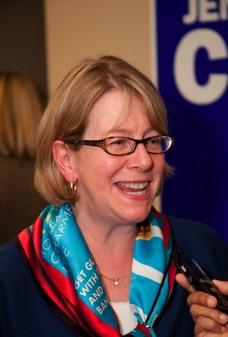“Friends, I have to say it: a strong, stable, national majority Conservative government,” Stephen Harper congratulated his crowd of exuberant Conservative supporters in Calgary.
Further west, the 50-odd Jennifer Clarke supporters in their Vancouver Centre headquarters broke out in their loudest ovation of the night.
Earlier in the evening, the Yaletown gathering’s optimism turned jubilant, with both cheers and jeers greeting the decimation of the Liberals, Michael Ignatieff’s ouster from his Toronto seat, and the stunning resignation of Gilles Duceppe, whose Bloc Québécois took a shellacking in Quebec, courtesy of Jack Layton and the NDP.
But it was a bittersweet night for Vancouver Centre Conservatives, with Clarke coming up short in her attempt to be among the 167 Conservatives who now wield a much-enhanced influence over Parliament.
It was not for lack of trying. With the riding’s results trickling in as the night progressed, Clarke always appeared within striking distance of Fry. At one point, just after 9pm, Clarke came within some 231 votes of overtaking Fry, who, in the end, never relinquished her often-threatened lead.
Unexpectedly, Clarke became caught up in a game of electoral leapfrog for the runner-up position with the surprisingly resilient NDP candidate Karen Shillington for a good portion of the evening. As Xtra goes to press, the preliminary Elections Canada results have Clarke trailing Shillington by only two votes.
By 11pm, Clarke emerged to thank her “most patient” campaign volunteers for waiting out the results, but did not concede to Fry, who had now begun to pull away from her rivals, establishing a 2,300-vote lead over Clarke.
“The wait isn’t over,” said a still-hopeful Clarke. “Elections Canada is still counting advance and special and other kinds of ballots, and the count is going to go late, so we’re not necessarily going to know the results for several hours, or until tomorrow morning. In five short weeks, we did one hell of a job,” she added.
By midnight, however, it was clear that Fry had managed to keep both Shillington and Clarke at bay to become one of only two Liberal MPs from BC who will go back to Ottawa.
Clarke congratulated her rivals who “offered themselves for public service. There was lots of choice for the voters of this riding and that’s what democracy is all about,” she said.
Later Clarke hailed the Conservative majority as “great news for the country. We’re not going to have the kind of turnover and electioneering that was constantly happening; I think that’s a good thing,” she told Xtra.
Clarke dismissed criticisms about the Conservatives’ alleged transparency and accountability deficit, saying the voters had “all those issues put before them” and they “clearly” opted in the end for the “kind of stability” a Conservative government offers.
As for her own showing, Clarke presented Fry with an even stiffer challenge than her Conservative predecessor Lorne Mayencourt in the 2008 election. Mayencourt lost the riding to Fry by more than 5,000 votes in a hotly contested race for the gay-heavy riding.
“I think people still remember me from my time on city council, and there was lots of recognition on the doorstep,” said Clarke, explaining her impressive performance against Fry.
“I think there was something of a vote split,” she added. “We had four strong women. They all offered a choice, and I think you saw a fairly close race.”
Clarke said whether she prevailed in the riding or not, gays have nothing to fear from a Conservative majority.
“Mr Harper has made it very clear we’re not having that [same-sex marriage] vote again,” she said. “Everyone had their chance to have a free vote and it’s over.”
Moreover, she says, Conservatives are allowed to “vote their conscience” on social issues. “It’s something that gays and lesbians “should also feel comforted by.”


 Why you can trust Xtra
Why you can trust Xtra


